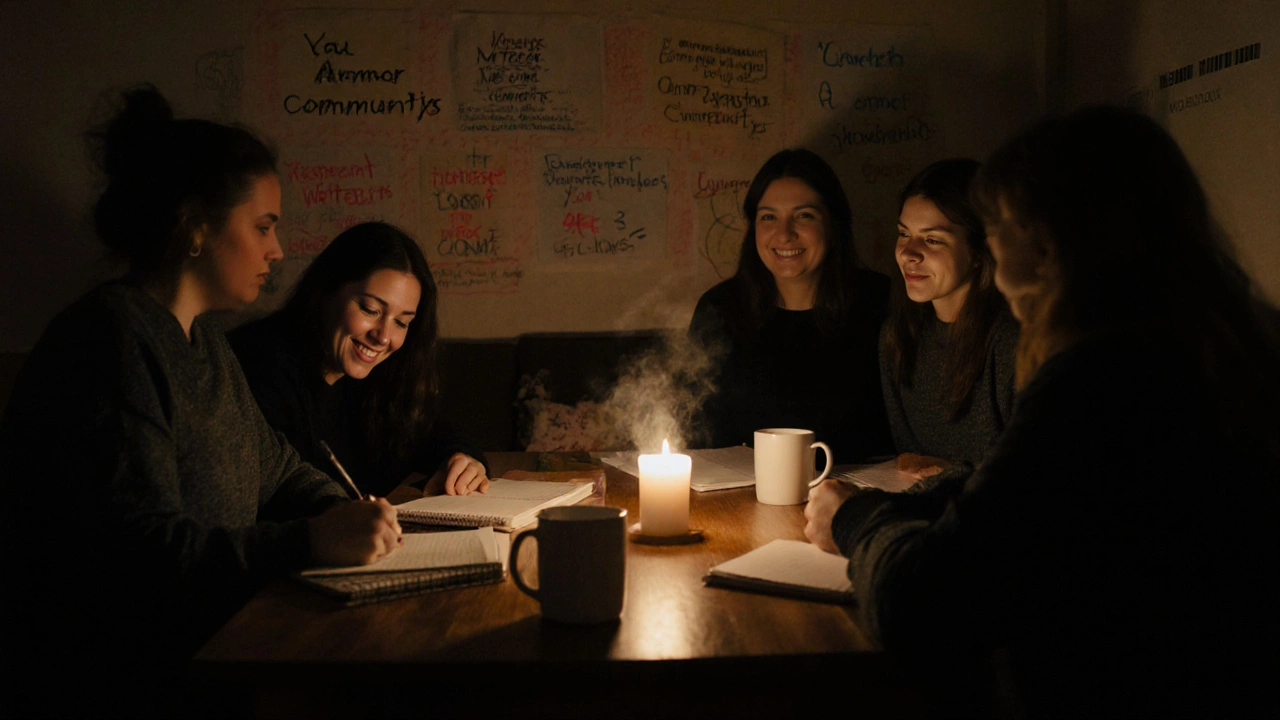You’ve seen the headlines: sensationalized, dehumanizing, reductionist. But behind every statistic, every moral panic, every news clip, there are real people living lives far more complex than the stereotypes suggest. This isn’t about sex work as a transaction. It’s about the quiet, daily acts of survival, dignity, and resistance that define the lives of those who do it.
They’re not what you think
Most people assume sex workers are victims-trapped, exploited, desperate. Some are. But many aren’t. Many chose this work because it offered flexibility, income, autonomy, or a way to survive when other options failed. One woman in Manchester told me she left a dead-end call center job after her child was diagnosed with autism. She needed hours that matched school drop-offs and therapy appointments. Sex work let her be home when it mattered. Another man in Liverpool used his earnings to pay for his mother’s cancer treatment. He didn’t want pity. He wanted to be seen as someone who cared.These aren’t rare exceptions. They’re the norm. A 2023 study by the Global Network of Sex Work Projects found that over 60% of sex workers surveyed said they entered the industry voluntarily, and 78% reported feeling in control of their work conditions. Control matters. When you’re not forced, when you’re not trapped, when you get to choose your clients, your rates, your hours-that’s power.
Resilience isn’t loud. It’s in the small things.
Resilience doesn’t always look like protests or documentaries. Sometimes, it’s just showing up.A trans woman in Birmingham wakes up at 4 a.m. every day to clean her apartment before her first client arrives. She doesn’t talk about it. She doesn’t post about it. But she does it because her space is her sanctuary. When the world treats you like you don’t deserve safety, you build it yourself.
Another sex worker in Glasgow keeps a notebook. In it, she writes down every client who treats her with respect. Not because she’s grateful. Because she needs to remember that not everyone sees her as a commodity. That notebook? It’s her lifeline on the hard days.
Resilience is learning to say no. It’s turning down a client who pushes boundaries. It’s walking away from a situation that feels off-even if it means losing money. It’s knowing your worth, even when society tells you otherwise.
How the law makes survival harder
In the UK, selling sex isn’t illegal. But almost everything around it is. Soliciting in a public place? Illegal. Working with another person? Illegal. Running a brothel? Illegal. Advertising? Illegal.This isn’t protection. It’s punishment dressed up as policy. It forces people into isolation. Into unsafe situations. Into the shadows where predators thrive.
One sex worker in London told me she used to work from home. Then a neighbor reported her. Police showed up. She lost her flat. She had to move to a room with no lock, no window, no way to call for help. She started working on the street. She didn’t want to. But she had no choice.
Decriminalization isn’t about making sex work easy. It’s about making it safer. It’s about letting people access healthcare, report violence, rent apartments, open bank accounts. It’s about treating them like humans-not criminals.

The real cost of stigma
Stigma doesn’t just hurt feelings. It kills.When you’re labeled a “prostitute,” your doctor assumes you’re irresponsible. Your landlord refuses to rent to you. Your bank closes your account. Your kids get bullied at school. Your parents disown you. You start to believe the lies.
One woman in Bristol told me she hadn’t told her sister she was a sex worker in 12 years. When she finally did, her sister cried. Not because she was ashamed. Because she realized how much she’d lost-how many birthdays, holidays, quiet dinners-they’d missed because of fear.
Stigma doesn’t just isolate. It erases. It makes people invisible. And when you’re invisible, no one notices when you disappear.
What helps? Community, not charity
The best support doesn’t come from NGOs handing out pamphlets. It comes from other sex workers.There are peer-led collectives across the UK-like the English Collective of Prostitutes in London, or the Scottish Network of Sex Workers in Glasgow. These aren’t charities. They’re mutual aid networks. They share safety tips. They organize transport. They help each other file police reports. They teach each other how to screen clients. They don’t ask for permission. They just do what needs doing.
One group in Leeds runs a weekly phone line. Just a number you can call if you’re scared, lonely, or need someone to talk to. No judgment. No advice. Just someone who gets it.
That’s resilience. Not waiting for someone to save you. Building your own safety net.

How to support without speaking for them
If you want to help, don’t start a fundraiser. Don’t write a blog titled “I Met a Sex Worker and It Changed My Life.”Instead:
- Amplify their voices. Share their stories-when they’re told by them, not filtered through someone else’s lens.
- Support organizations led by current or former sex workers. Not charities that speak for them, but ones that let them speak for themselves.
- Push for decriminalization. Write to your MP. Sign petitions. Talk to your friends. The law is the biggest barrier.
- Don’t assume. Don’t pity. Don’t romanticize. Just listen.
Resilience doesn’t need saviors. It needs allies.
What you won’t hear in the news
You won’t hear about the sex worker who started a podcast about mental health. Or the one who taught herself coding and now runs a freelance business on the side. Or the grandmother who works part-time to pay for her grandson’s college tuition.You won’t hear about the quiet pride in their eyes when they finally buy their own car. Or the way they laugh with their friends after a long night. Or how they still believe in love, even after being told they’re unworthy of it.
These aren’t side stories. They’re the real ones.
They’re not broken. They’re surviving.
Sex work is not a moral failure. It’s not a tragedy. It’s work. Hard, complex, often dangerous work. But it’s work done by people who are trying to live, to care, to survive-and sometimes, to thrive.Their stories aren’t meant to shock. They’re meant to remind us: humanity doesn’t come with conditions. Dignity isn’t earned through purity. Resilience doesn’t need applause. It just needs to be seen.
Are all sex workers victims?
No. While some people are trafficked or forced into sex work, many enter it voluntarily. Research shows most sex workers choose it for reasons like flexible hours, higher pay, or autonomy. Assuming everyone is a victim ignores their agency and makes it harder to support those who actually need help.
Is sex work legal in the UK?
Selling sex is legal in the UK, but many related activities are not. Soliciting in public, operating a brothel, or sharing premises with another worker are all criminalized. This creates unsafe conditions, pushing people into isolation and making it harder to screen clients or report abuse.
Why do people say sex work should be decriminalized?
Decriminalization means removing laws that punish sex workers for working safely-like sharing a space or advertising. It doesn’t mean legalizing pimping or trafficking. It means treating sex work like other jobs: allowing workers to access housing, healthcare, and legal protection without fear of arrest. Countries like New Zealand have shown this reduces violence and improves safety.
How can I support sex workers?
Listen to sex workers themselves. Support organizations led by current or former workers, like the English Collective of Prostitutes. Advocate for decriminalization. Don’t donate to charities that speak for them-support ones that let them speak for themselves. And challenge stigma when you hear it.
Do sex workers have access to healthcare?
Many avoid healthcare because they fear judgment or being reported. Some clinics have sex worker-friendly services, but stigma still blocks access. Peer-led groups often help connect workers to doctors, counselors, or sexual health services without fear of being outed.
These stories aren’t outliers. They’re the truth behind the headlines. And if you’re willing to listen, you might just learn something about resilience you never expected.


eugene kraft
November 6, 2025 AT 06:09I never thought about how the law forces people into dangerous situations just by making it illegal to work together or advertise. That London story about losing her flat? That’s not justice-that’s systemic cruelty. I’ve read studies on decriminalization in New Zealand, and the drop in violence is staggering. Why are we still clinging to moral panic instead of evidence?
Also, the notebook thing? That’s genius. Keeping a record of good clients isn’t just practical-it’s psychological survival. I’m stealing that idea.
Timothy Schreiber
November 8, 2025 AT 00:51Let me be clear: sex work is work. Period. It’s not a moral issue. It’s an economic one. And when you criminalize the tools that make it safer-like sharing space, screening clients, or even having a buddy nearby-you’re not protecting anyone. You’re just making it harder for people to survive. The data doesn’t lie: decriminalization saves lives. End of story.
Also, peer networks? That’s the real magic. Not charities. Not saviors. Just people helping people. That’s how communities actually work.
Kelley Moody
November 8, 2025 AT 21:12Thank you for writing this. Honestly, I needed to read it today. I’ve been trying to explain to my family why I support decriminalization, and they keep saying, ‘But what about the victims?’ And I say-yes, victims exist. But so do people who chose this. And they deserve dignity too.
That Glasgow notebook? I’m crying. That’s the kind of resilience that doesn’t make headlines. But it’s the kind that keeps people alive. Keep sharing these stories. We need more of them.
Antony Silson
November 10, 2025 AT 13:26Rick Vaughn
November 12, 2025 AT 00:43Fact: 92% of sex workers report trauma histories. You call it agency. I call it conditioned coping. This isn’t resilience. It’s trauma bonding dressed in empowerment rhetoric. The data you cite? Flawed. Self-reported. Biased. And you ignore the traffickers who use ‘choice’ as a cover. This isn’t advocacy. It’s gaslighting.
Jenna Song
November 13, 2025 AT 14:51Oh honey, please. You think the ‘resilient sex worker’ trope is any less reductive than ‘victim’? You’re just swapping one stereotype for another. Now they’re all little warriors with notebooks and side hustles? What about the ones who are just… tired? The ones who don’t want to be ‘inspirational’? Who just want to go to the grocery store without getting stared at? You turned their pain into a TED Talk.
Also, ‘decriminalization’ sounds nice until you realize half the people in those ‘peer collectives’ are still getting raided. You don’t fix a broken system by slapping a sticker on it.
Kerrigan Arnold
November 15, 2025 AT 12:21There’s a difference between respecting autonomy and ignoring harm. I’ve worked with survivors of trafficking for over a decade. Many were sold under the guise of ‘choice.’ The line between coercion and consent gets blurry when you’re broke, isolated, and told you’re worthless.
That said-I agree with the call for decriminalization. Not because it’s perfect, but because criminalization makes everything worse. The peer networks? Vital. The stigma? Deadly. The solution isn’t to glorify survival-it’s to make survival unnecessary.
Let’s focus on housing, healthcare, and income support. Then we can talk about ‘agency’ without sounding like we’re selling a fantasy.
Kacey Graham
November 15, 2025 AT 21:59Melissa Gainor
November 17, 2025 AT 07:28Wait-did you mean ‘decriminalization’ or ‘legalization’? I think you’re using them interchangeably but they’re totally different. Legalization means the state regulates it like a business. Decriminalization means removing criminal penalties. New Zealand did the latter. And yeah, the grammar in the post is kinda messy, but the message matters more. Also, ‘prostitute’ is outdated. ‘Sex worker’ is preferred. Just saying.
And that notebook thing? So beautiful. I’m gonna start one too. For good people. Not just clients. Like… my barista who remembers my order. You know?
demond cyber
November 19, 2025 AT 04:44I’ve been thinking about this a lot lately. Not just because of the article, but because my cousin-she’s 29, works nights cleaning offices, but also does online cam work on weekends to pay off her student loans. She never talks about it. Not even with me. I found out because she left a browser tab open. I didn’t say anything. I just made her coffee the next morning and asked how her week was.
That’s what this post is really about. Not policy. Not politics. Just… seeing people. Not as problems. Not as saints. Not as statistics. Just as humans trying to get by. And sometimes, that’s enough. You don’t need to fix it. You just need to not look away.
Also, I’ve started donating to the English Collective of Prostitutes. Not because I think it’s the only solution. But because they’re the ones actually doing the work. And they don’t need my pity. They need my silence, my vote, and my willingness to shut up and listen.
That’s all I’ve got. But it’s real.
And if you’re still reading this? Thank you. You’re part of the change, even if you didn’t mean to be.